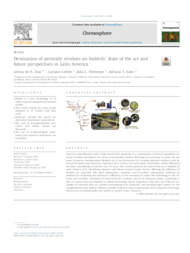Destination of pesticide residues on biobeds: State of the art andfuture perspectives in Latin America.
Destination of pesticide residues on biobeds: State of the art andfuture perspectives in Latin America.
Author(s): DIAS, L. de A.; GEBLER, L.; NIEMEYER, J. C.; ITAKO, A. T.
Summary: Land-use intensification with a high demand for pesticides is a consequence of human population in-crease. Feasible alternatives for correct concentrated residues discharge are necessary to avoid soil andwater resources contamination. Biobeds arein situbioreactors for treating pesticide residues, used byseveral European and American countries due to its low cost and simple construction, whose efficiencyhas been scientifically proved for over 20 years. This review presents the state of the art of biobeds inLatin America (LA), identifying advances and future research needs. Factors affecting the efficiency ofbiobeds are discussed, like ideal temperature, moisture, and microbial communities, followed bymethods for evaluating the bioreactor?sefficiency. It was necessary to adapt this technology to the cli-matic and economic conditions of Latin-American countries, due to its European origins. Guatemala isthe LA country that uses biobeds as official technology. Brazil, Argentina, Costa Rica and Chile are ex-amples of countries that are actively investigating new substrates and pursuing legal aspects for theestablishment of the biobeds. Robust scientific evidences may enable farmers start using this technology,which is an environmentally safe system to protect water resources
Publication year: 2020
Types of publication: Journal article
Unit: Embrapa Grape & Wine
Keywords: Biodegradation, On-farm treatment, Organic pollutants, Pesticides
Observation
Some of Embrapa's publications are published as ePub files. To read them, use or download one of the following free software options to your computer or mobile device. Android: Google Play Books; IOS: iBooks; Windows and Linux: Calibre.
Access other publications
Access the Agricultural Research Database (BDPA) to consult Embrapa's full library collection and records.
Visit Embrapa Bookstore to purchase books and other publications sold by Embrapa.

